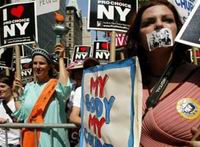
More than 100,000 demonstrators marched past a heavily fortified Republican convention hall on Sunday, chanting denunciations of the administration and the war in Iraq as delegates flocked to the city to nominate US President Bush for four more years in the White House.
Vice President Dick Cheney campaigned his way into the convention city three days ahead of the president, praising him as "calm in a crisis, comfortable with responsibility and determined to do everything needed to protect our people." He spoke on Ellis Island, framed by a Manhattan skyline altered irrevocably by terrorism.
Bush was in West Virginia, accusing Democratic rival Sen. John Kerry of changing his stand on coal industry issues that are vital to the state's economy. "Be careful of somebody whose position shifts in the wind," he said.
Bush presented his standard campaign defense of the war in Iraq, saying, "America and the world are safer because Saddam Hussein sits in a prison cell." But in an interview with Time Magazine, the president suggested he had underestimated the struggle of the postwar period in Iraq.
"Had we to do it over again, we would look at the consequences of catastrophic success, being so successful so fast that an enemy that should have surrendered or been done in escaped and lived to fight another day," Bush said.
Vice presidential candidate John Edwards responded for Kerry and the Democrats. "President Bush now says his Iraq policy is a catastrophic success. He's half right. It was catastrophic to rush to war without a plan to win the peace," he said.
Bush and Kerry are locked in a tight race for the White House, although recent polls suggest momentum for the president. A group of Vietnam veterans have been running commercials accusing Kerry of lying about his decorated service in Vietnam, allegations that official Navy documents dispute and Kerry has denounced as a Republican-driven smear. Still, fellow Democrats concede the unsubstantiated claims may be hurting his candidacy.
Polls show the war in Iraq has become increasingly unpopular in recent months, and the throng of protesters filling 20 city blocks on a steamy Manhattan afternoon underscored that. "No More Bush," and "No More Years," were two of the more popular chants. "Bush Lies, Who Dies?," read some of the signs.
Several protesters carried flag-draped, coffin-shaped boxes through the streets, meant to draw attention to the US death toll in Iraq.
The Pentagon says 969 Americans have died in action, including 831 since Bush stood on an aircraft carrier more than a year ago before a banner that read "Mission Accomplished."
Police gave no official crowd estimate of the day's protest. One official put the size at 120,000, although it took nearly five hours for the procession to pass Madison Square Garden. Delegates meet there beginning Monday to nominate Bush and Cheney for second terms.
Organizers claimed they had turned out roughly 400,000 protesters.
In all, about 100 arrests were reported, with no major outbursts of violence. At mid-afternoon, a small fire erupted along the protest route a half block from the Garden. Police quickly doused the flames, then handcuffed two people and led them away.
Thousands of police, some dressed in riot gear, others bearing automatic weapons, watched as the protesters passed. Extensive as it was, the force represented only a portion of an unprecedented security deployment designed to protect the city, New Yorkers and Republicans during the convention week.
Homeland Security Secretary Tom Ridge said last week the efforts would include air surveillance over the city, monitoring activity in the harbor and stationing security personnel at every hotel housing any of the 2,508 delegates or 2,344 alternates.
After months of appealing to his conservative supporters, Bush and his convention planners scripted a program pitched toward the political middle, independents and wavering Democrats. Sen. John McCain was on the program for the convention's opening night Monday. The Arizona Republican has widespread appeal among independents that stems in part from his own presidential campaign four years ago and his drive for campaign finance reform.
California Gov. Arnold Schwarzenegger, who espouses a more moderate brand of Republicanism than the president, speaks Tuesday night. Democratic Sen. Zell Miller of Georgia delivers the keynote address on Wednesday.
Several of the speakers, McCain and former New York City Mayor Rudolph Giuliani among them, oppose the constitutional amendment to ban gay marriages that Bush has made a centerpiece of his campaign and is prominent in the Republican platform.
Cheney speaks Wednesday and Bush addresses the delegates and a nationwide television audience on Thursday. Aides have said he will use the speech to lay out an agenda for a second term.
Republican officials also say they intend to use the four-day convention to build support for Bush's handling of the war on terror and the war in Iraq as well as to undermine Kerry's claim as a suitable replacement.
In Wheeling, W.Va., Bush described Kerry as "a fellow who is kind of shifting" on coal issues.
"A while ago he said coal is a dirty source of energy. Then he decided he wanted to come to your state, and knock on your door. And then he said, now, well, I am for legislation that is supporting clean coal technology," Bush said.
In response, the Kerry campaign issued a statement that said Bush had cut funding for mine safety and generally failed to protect coal miners.
(China Daily via Agencies August 30, 2004)
|

